Getting an Enterprise Resource Planning or ERP software can be intimidating for small businesses. But in the time of the COVID-19 pandemic when the need to access your business systems from anywhere and anytime is crucial, having an ERP solution—especially a cloud-based one—is a smart move.
Now you may ask: why should you even bother with an ERP software solution? The short answer is because of the benefits you can gain from an ERP system. These include boosting employee productivity, improving operational efficiency, and generating accurate reports. It is also able to simplify and automate critical business processes, give you real-time visibility across your organization, and provide the flexibility that every growing company requires to adapt to the unprecedented changes in the business environment. You can head over to our extensive analysis of ERP systems to learn more about this type of solution and what it can do for your business.

What are the 12 best ERP systems for small business?
Small businesses are vital economic drivers but they have also been the ones hit the most by the COVID-19 outbreak. In the US alone, there are 30.2 million small businesses, which accounts for 99.9% of all business firms in the country. A study on the impact of COVID-19 on small businesses reveals that 43% of small businesses had closed temporarily in the midst of the pandemic. Among these businesses, only 47% expected to reopen within a four-month period.
A year after the pandemic hit, the majority of small businesses are still far from recovering fully, but some have already made changes as they strive for business continuity post-COVID. Among these changes include acquiring the necessary tools, such as ERP solutions, to which they expect to help them regain their foothold in an ever-changing industry. More than ever, business owners are now more aware that they need to be agile and to be able to evolve with small business trends. They have to quickly adapt to future-proof their businesses and make them more dynamic and responsive to overcome challenges.
Source: Panorama Consulting Group 2020 ERP Report
The great thing about ERP software is you won’t need separate solutions to address the many areas listed in the survey findings. ERP software is an integrated package of tools and capabilities built to help you manage various operational and functional areas of your business, such as customer relations, human resources, hiring and onboarding, revenues and expenses, asset and resource management, regulatory compliance, and many more.
How can ERP software support compliance and regulatory needs?
For small businesses, staying compliant with industry regulations and government standards is essential to avoid fines and ensure smooth operations. ERP software can simplify compliance by providing integrated tools and automated processes designed to meet regulatory requirements.
- Automated Documentation and Record-Keeping
ERP systems automatically document transactions, maintain audit trails, and store records in an organized manner, which simplifies the process of retrieving information for audits or compliance checks. This is especially helpful for businesses dealing with financial or customer data regulations. - Real-Time Monitoring for Compliance
Many ERP solutions offer dashboards and alerts that monitor key compliance metrics in real-time. This feature can be crucial for industries where adherence to specific standards, like safety or environmental guidelines, is required. Real-time visibility allows companies to identify and address compliance issues before they escalate. - Data Security and Privacy Controls
Most ERP platforms include security features, such as encryption, role-based access, and two-factor authentication, to protect sensitive information. This not only prevents unauthorized access but also ensures compliance with data privacy regulations like GDPR or CCPA. - Regulatory Reporting Tools
ERP systems can generate reports tailored to regulatory requirements, such as tax compliance, labor laws, and financial disclosures. Customizable reporting templates enable companies to streamline the process of submitting necessary documentation to regulatory bodies. - Built-In Compliance Modules
Some ERP solutions offer specific compliance modules for industries with stringent regulatory demands, like healthcare, manufacturing, and finance. These modules help businesses automatically adhere to industry standards by embedding necessary procedures within their workflows.
Get to know the leading ERP products with our list of 12 best ERP software for small businesses.
1. NetSuite ERP
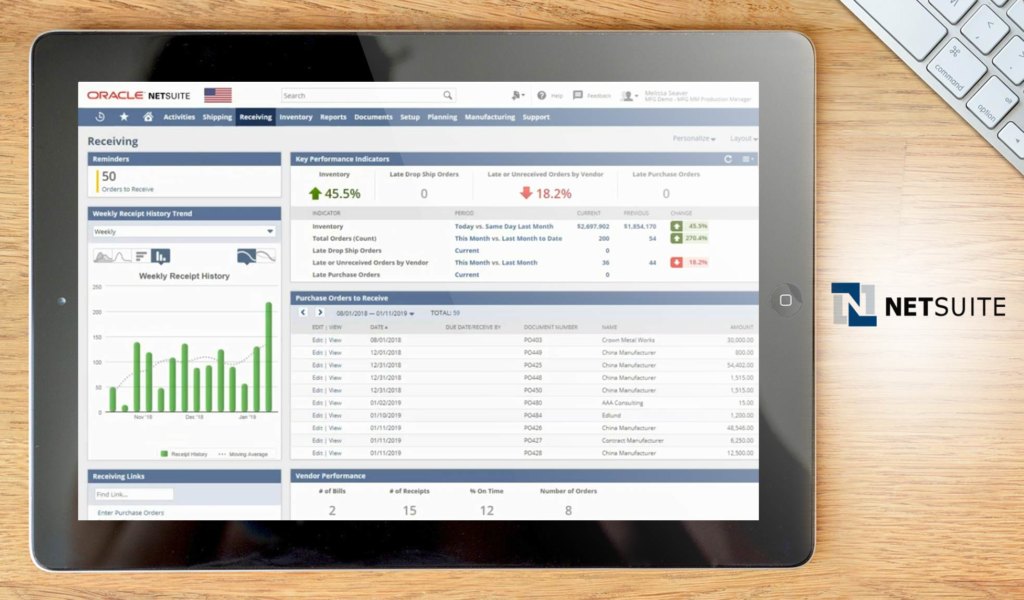
First in our list of 12 best ERP software for small business is NetSuite ERP. This modern, cloud-based ERP platform is designed to scale as your business grows. The product is from Oracle, which guarantees that you get only the best software from a global leader in business technology solutions. NetSuite ERP is being used by more than 16,000 enterprises of various sizes and industries in over 160 countries, earning the title of “the world’s most deployed cloud ERP solution.”
NetSuite ERP brings you all the tools and modules you need to automate business processes such as accounting, demand planning, manufacturing operations, billing and invoicing, financial management, revenue management, fixed assets, order management, warehouse administration, and inventory management. It provides you with full visibility into all functional and operational areas across your organization through KPIs, business intelligence, and accurate reporting. These are intended to guide you in making well-informed, data-backed decisions. You can leverage the NetSuite ERP free demo, to learn more about its advanced features.
Companies have different unique business requirements. Hence, pricing for NetSuite ERP is offered on a quote basis. This allows the vendor to tailor a custom package for your company based on the modules and add-ons you need and the number of users per month. To learn more, you can sign up for NetSuite ERP free demo here.
Small Business Benefits:
- Business finance made simple through automation and a fast, proven solution
- Real-time insights to give you a complete picture of your business
- Grow new products, channels, and markets with agile features and capabilities
- Get rid of on-premise IT costs with an ERP system that is flexible, scalable, and always current
Detailed NetSuite ERP Review
2. Wrike
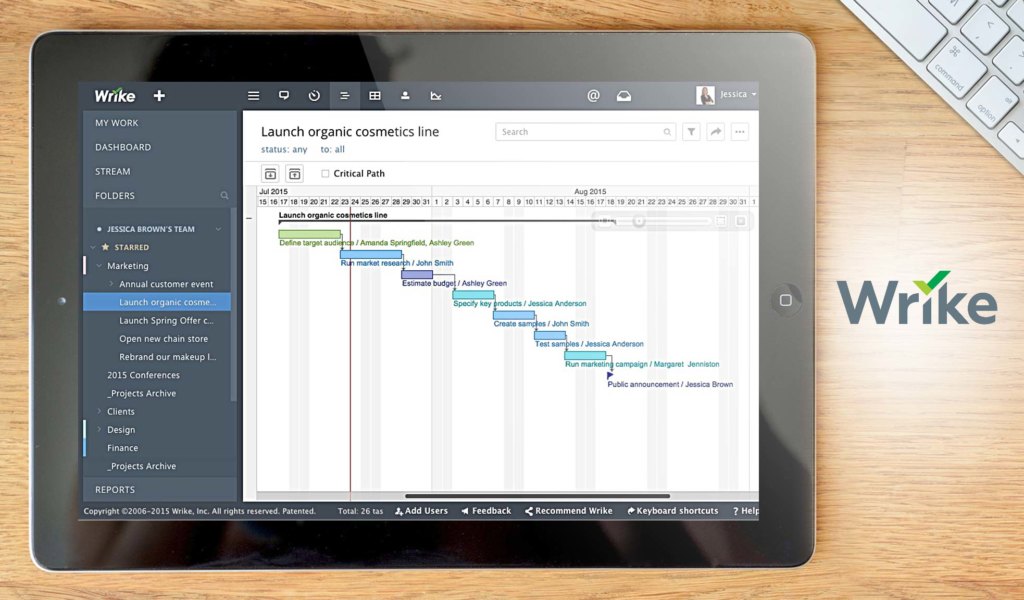
Wrike is a cloud-based solution that helps streamline collaboration between people working in the same physical space as well as those working in different locations. With this service, tasks and their statuses can be planned, prioritized, discussed, and monitored in real time with minimal effort.
Wrike provides a three-pane project overview. Your current projects’ information is in one place, simplifying work. The left panel shows the project hierarchy, letting you switch between levels and work on smaller tasks. The central pane shows project tasks while the right panel shows the details. This view makes it easy to monitor collaborators’ activities. You can @mention them as well to call their attention to a problem.
Wrike is built to work with B2B applications and software to make things easier for your team. It works well with Google Drive, Dropbox, Salesforce.com, Slack, and Zendesk, among others. It offers a free plan that’s ideal for startups and freelance marketers. As the business grows, you can choose from any of the three paid plans, starting at $9.80 per user per month, for more robust features or request a quote for an enterprise plan.
Small Business Benefits:
- Keep all of your work in one place.
- Navigate easily through projects, tasks, and databases.
- Allow only authorized individuals to can access your information or files.
Detailed Wrike Review
3. Acumatica

Acumatica is a cloud-based enterprise resource planning (ERP) platform that provides the essential foundation for small, growing, and midmarket size companies to have the capability to sustain continued operations amid rapid changes in their environment. It allows organizations to have the flexibility and efficiency needed to thrive in the digital economy. Acumatica supports telework and mobile setup and provides teams with the most complete ERP applications.
The Acumatica platform is composed of a robust set of tools that support multi-entity intercompany accounting, financial management, project accounting, CRM, payroll, and other business processes. It offers flexible deployment options, which can either be on-premise or through private cloud hosting. Acumatica seamlessly integrates with business apps such as HubSpot, ProCore, Salesforce, and Shopify. Pricing for Acumatica license depends on your specific requirements.
Small Business Benefits:
- The comprehensive suite of connected applications improves competitive positioning
- Accurate inventory delivered by just-in-time manufacturing
- Greater transparency, accuracy, and agility in financial management
Detailed Acumatica Review
4. Rossum

Rossum helps small businesses automate key processes through document-management-based ERP workflow that can tie up all business fronts. It has a smart cognitive data capture technology that quickly scans, collects, and validates all documents including forms. So, information from seemingly disparate areas can be integrated to be used in managing an organization. This feature is powered by AI and is automated. So, small business owners can concentrate on mission-critical tasks rather than doing back-end clerical work.
The capture is also available in native applications for Android and iOS devices.
Moreover, this unique technology also has a failsafe. If there are missing data or data with low confidence scores, the program automatically prompts the user to verify. Moreover, it is also trainable using user feedback. Thus, it gets more accurate over time. This feature is perfect for capturing and managing documents like invoices and forms. Hence, many organizations leverage it for automating various enterprise resource management processes including logistics-related ones.
The platform is also fitted with many other automations and is highly flexible. In fact, the software provider deploys the Rossum platform customized according to an individual organization’s needs. It also has communication tools for team coordination and management. This includes a dashboard for cues for document-based task lanes that can be used for purchase order approvals and more. Other key ERP features include audit trails, reporting, and analytics. Moreover, it has advanced data compliance capabilities to keep data assets safe.
Any ERP tool is not complete without integrations. It needs to be able to “talk” to other specialized business apps in order to manage the whole breadth and depth of an organization. And, Rossum is fitted with many integrations including those for Zoho Books, Google Drive, and Oracle Netsuite.
Lastly, as it is deployed according to a particular business’ requirements, it is only available in customized plans.
Detailed Rossum Review
Small Business Benefits:
- Document management and enterprise resource management capabilities
- Smart capturing helps automate clerical tasks
- Single document gateway to unify organization-wide information transfers
5. Method:CRM

Method:CRM offers an online solution that fully integrates with QuickBooks to help small companies streamline their sales processes. Designed for scalability and customizability, this comprehensive system lets you manage leads, track opportunities, process payments, as well as facilitate all your sales team’s processes. It utilizes a modern, connected approach through cloud technology that makes it applicable for use in a wide range of industries such as accounting, construction, field service, and manufacturing, to name a few.
The core of this CRM system is the lead management function which allows users to boost sales and ensure no prospective client falls through the cracks. It also supports invoicing, time tracking, work order management, and job scheduling so teams can manage all their processes in one place. Moreover, the platform can generate custom reports and dashboards so that teams can gain insights into their day-to-day operations.
Method:CRM offers three pricing plans depending on the functionalities that you need. Prices range from $28 to $85 per user per month.
Small Business Benefits:
- Flexible and affordable pricing
- Intended for small businesses that need a customizable platform for their CRM processes
- Built to unify data, connect teams, drive real-time insights, and propel growth.
Detailed Method:CRM Review
6. Scoro
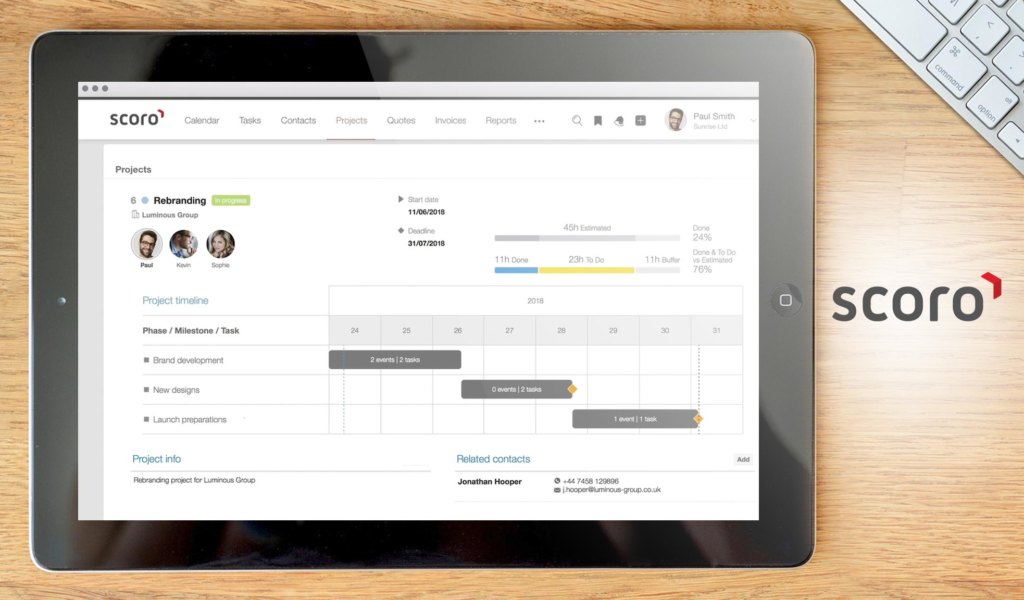
Scoro is an all-in-one online business management platform specifically designed for small and midsized businesses. Those engaged in services, sales, and project management can get work done faster and more efficiently by leveraging Scoro’s key features, which include work scheduling and tracking, collaboration, CRM, quoting and billing, and advanced reporting and dashboards. All these can be controlled from a central hub where tasks, calendar events, KPIs, accounts, and important information are displayed.
With Scoro, you can manage every stage of your project, automate billing and invoicing, get a full overview of contacts, keep tabs on performance indicators, and view detailed financial reports. The software is also fully configurable, allowing you to set user permissions, select from built-in templates or create your own for invoices and order, and configure activity or product types. Scoro can integrate with over 1,000 external apps through Zapier and offers mobile apps for iOS and Android for accessing the software on the go. You can make use of the Scoro free trial to test drive the software.
Scoro is available in four low-cost plans starting with the Essential Plan at $26/user. This is for small teams looking to manage all the important aspects of their business without having to switch between apps and spreadsheets.
Small Business Benefits:
- Manage time more efficiently and allocate resources according to capacity
- Track and manage everything about your project from one place
- Take charge of your finances, purchases, and costs, and automate invoice reminders
- Manage your sales funnel and get a full view of each contact
Detailed Scoro Review
7. Kechie ERP
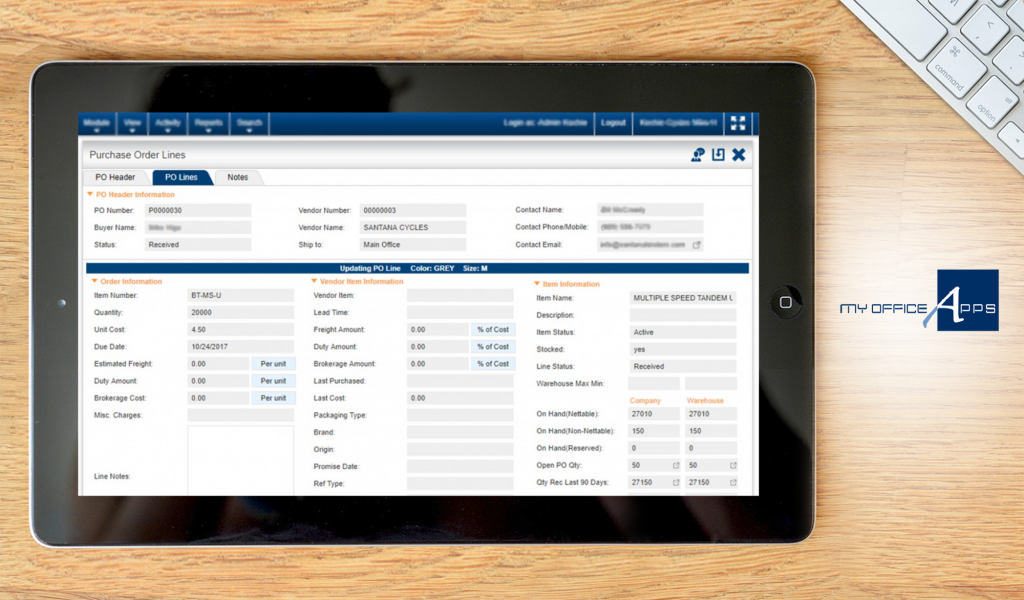
Kechie ERP is another ERP solution ideal for small businesses. It is an all-in-one platform that combines CRM functionalities with inventory management, customer support, financial management, and supply chain management.
As a fully-integrated solution, Kechie ERP can help you streamline your business processes, from automating and synchronizing your inventory management to analyzing customer interactions, sales pipelines, and other customer relationship data. Moreover, Kechie ERP is based on a highly-secured cloud infrastructure. It comes with flexible configuration tools to help you customize the application down to the user level.
The software is ideal for businesses in apparel, electronics, pets, food, consumer goods, medical, metal, government, and nonprofit industries. With feature modules in finance, CRM, sales, manufacturing, procurement, and warehouse management, Kechie ERP delivers powerful tools to help you run your business more efficiently.
Pricing for Kechie ERP is available by quote. You may reach out to the vendor for a tailor-made plan of the software.
Small Business Benefits:
- Provides ERP information on a real-time basis
- Allows you to address customer requests immediately
- Helps you manage warehouse locations
- Keeps track of your sales pipeline
Detailed Kechie Review
8. Tipalti

Tipalti is a comprehensive business management platform with a large focus on streamlining financial processes with other operations. It helps businesses keep track and process payments and suppliers while keeping them safe from financial risks and tax compliance issues. Tipalti’s end-to-end accounts processing solution is also fitted with advanced features including currency selection, reconciliation, fraud detection, and mass payment processing.
With its global reach, it is perfect for small businesses with clients across the globe. The solution is also very flexible. It is being used by a wide range of companies and business operations ranging from the financial industry to social network influencers. Tipalti automates all the accounts payable (AP) processes needed to perform in the modern business setting.
Moreover, the solution is also fitted with robust reporting tools for analytics and visualizations useful for presentations. Other modules include those for managing procurement, suppliers, and invoices. It also integrates with other popular business solutions like QuickBooks Online and Netsuite. Lastly, the product is customized for each client. So, it is only available in quote-based plans.
Small Business Benefits:
- Automate all payment-related processes
- Integrate seemingly disparate operations like supplier management and logistics through its many modules
- Comply with national and international tax standards
Detailed Tipalti Review
9. Brahmin Solutions
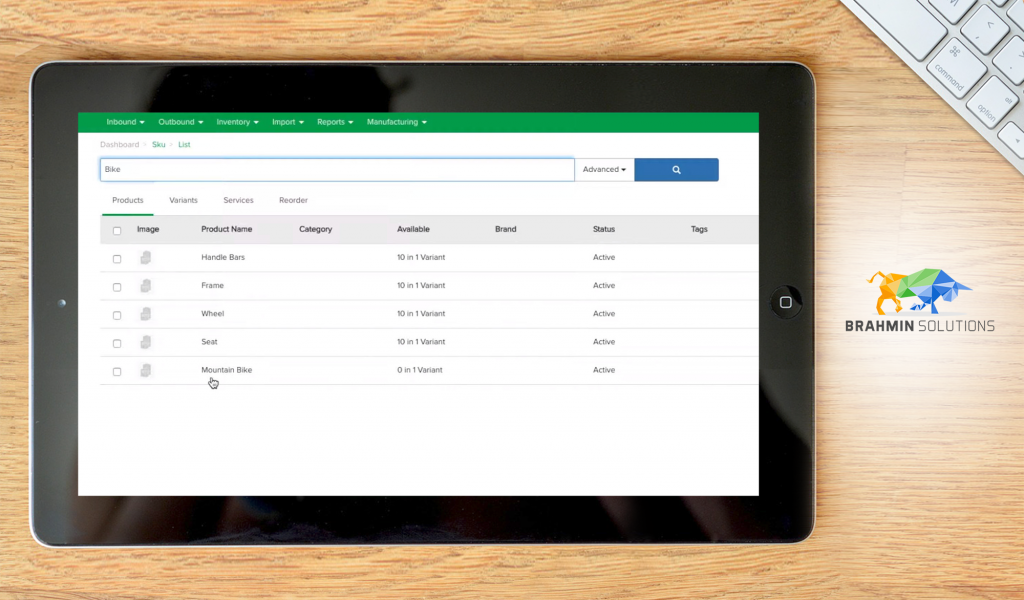
Brahmin Solutions offers an enterprise-grade inventory management system that helps small businesses optimize their inventory and order management using a single platform. Its multichannel inventory management feature enables businesses to sell in different currencies while managing inventory in their default currency. You can also have clear visibility over all your sales channels’ inventory by enabling data synchronization, which gives you real-time updates on your sales channels’ sales and warehouse. You can also keep track of your perishable items’ expiration dates, so you can sell the products before they expire and avoid sales loss.
Replenishing stocks is made easier using a one-click reorder functionality, which allows you to set a minimum and maximum purchase limit for each item. Upon reordering, you can generate vendor bills, which can be processed by Brahman Solutions’ accounting features, or you can forward to your integrated accounting system.
Brahmin Solutions’ reporting tools help you stay on top of your business’ overall health and status. Its reporting feature allows you to can generate reports and assess the performance of your products’ sales, your sales channel, and sales representative. You can also get customer sales reports as well as profit margin, quote, invoice reports, and more.
Brahmin Solutions also has an extensive list of third-party integrations, such as ecommerce platforms, marketplaces, accounting systems, payment gateways, shipping and fulfillment, EDI, and 3PL. The starting price is $199/month and good for five users or fewer, which is ideal for growing small businesses with a maximum of 1,000 orders per month.
Small Business Benefits:
- Highly customizable depending on business size, type, and needs.
- Easy to use and implement.
- Fixed pricing on starter plan.
Detailed Brahmin Solutions Review
10. Odoo

Odoo is a management platform that brings you dozens of tools to help you manage vital areas of your business, such as sales, marketing, finance, operations, human resources, and communications. There are also features for managing projects, boosting productivity, building your own website, and creating your own custom applications. Since you’re free to create and add your own custom apps while using the platform, the number of apps in Odoo’s fold has accumulated, covering virtually all your business requirements with a one-stop-shop solution. This universal approach veers away from the traditional ERP model, offering you a platform that is extremely modular but fully integrated. This is why it has also grown its user base and is available in two dozen languages.
Pricing is set at $18.75/user per month ($15/month if paid annually), plus the cost of the apps that are used, normally ranging from $8 to $24. However, certain apps are free to use by any number of users. Odoo provides a calculator on its pricing page so you can match users and apps and know how much you have to pay each month or for one whole year.
Small Business Benefits:
- Pay as you go and only with the apps you use
- Apps are fully integrated with each other and get rid of interfaces between different apps
- No additional cost whether you deploy Odoo via cloud or on-premise
Detailed Odoo Review
11. Business Cloud Essentials
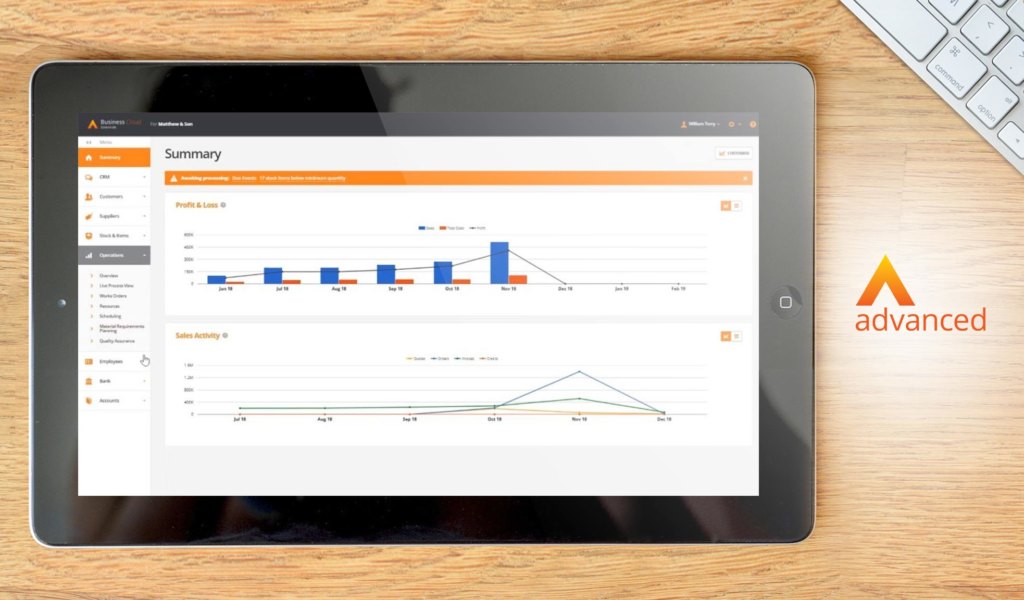
Business Cloud Essentials is a comprehensive, cloud-based ERP software designed by UK’s Advanced. It is a robust solution that comes with multiple modules, including CRM, accounting, payroll, and operations. Owing to its extensive set of features, the solution is ideally perfect for small and medium businesses with diverse operations and unique requirements.
Manufacturing teams can use Business Cloud Essentials to schedule work orders, create Bills of Materials, manage the repair of inventories, and streamline quality management. Likewise, accountants can leverage the power of the accounting module to streamline financial management. The platform provides multiple transactional templates to minimize accounting errors and wrong entries. Besides, it offers a multicurrency accounting platform that makes it easy to transact in more than 160 currencies around the world.
The payroll module enables HR teams to remunerate staff in a way that is compliant and accurate. That’s not all; Business Cloud Essentials facilitates the analysis of labor costs per job, project, or department. This way, business owners can get a 360-degree view of their finances. Most importantly, the platform provides a CRM module to help businesses understand their customers and prospects.
Business Cloud Essentials offers subscription-based pricing. The pricing is perfectly suited to small and midsized businesses, especially those with diverse operations.
Detailed Business Cloud Essentials by OpenHR Review
Small Business Benefits
- Simplify financial management to eliminate all financial worries
- It helps remunerate staff in an accurate and timely manner
- Bring together all manufacturing processes
- Understand your customers and prospect with up-to-date information
12. Sage Intacct
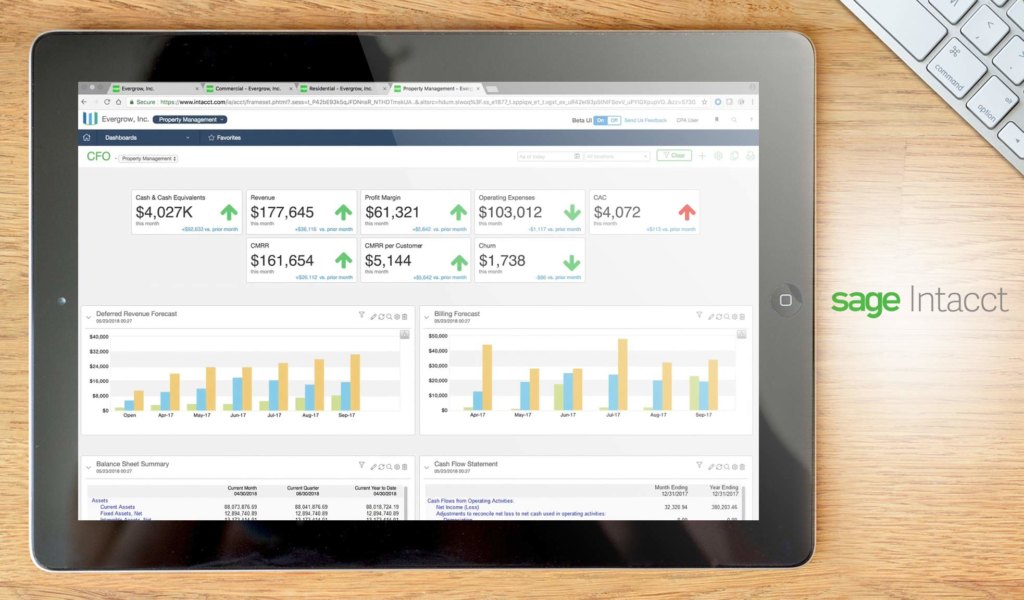
Sage Intacct is a small business management and accounting platform that is part of Sage’s Business Cloud solutions. As a testament to its capabilities, Sage Intacct is the preferred financial app of the prestigious American Institute of Certified Public Accountants (AICPA). The software is intended to address the financial and accounting requirements not only of CPAs and accounting firms. It is also designed for startups and growing companies from a wide range of industries, such as those in the financial services, healthcare, hospitality, professional services, franchise, wholesale distribution, nonprofits, and others.
What you get with Sage Intacct is a flexible platform with advanced functionalities to help you manage company finances, automate complex processes, increase productivity, and help you make informed decisions. It gives you tools and features for spend management, cash management, accounts payables and receivables, and order management, among others. Furthermore, it offers additional modules to extend the platform’s functionality as your business grows and evolves.
Pricing for Sage Intacct is quote-based. The vendor will customize a subscription plan for your company based on the needs of your type of business, and the modules and features you need. Included in your plan are updates and enhancements, US-based customer support, and 24/7 access to the platform.
Detailed Sage Intacct Review
Small Business Benefits:
- Core features that are built for finance by financial experts
- Streamline complex financial and accounting processes
- Configurable workflows, preferences, settings, and screens with no need for coding
- Real-time operational metrics and advanced reporting
Robust ERP Solutions for Small Businesses
Just because your business is a small one does not mean you have to miss out on the tools used by medium-sized companies and large enterprises and the benefits they gain from them. The 12 best ERP software for small business we discussed above show that you can access high-quality features that can transform your organization’s operations.
Among those, NetSuite ERP is the leading one because of its powerful automation capabilities. That is just one of the many reasons that over 16,000 organizations use it. Others include robust reporting functions, reduced IT costs, and greater flexibility when it comes to software implementation. There are more to discover, and you can find out for yourself when you explore the NetSuite ERP platform. The vendor has an appealing free trial where you can tinker with the features at no cost.
While an ERP software solution is a comprehensive package of tools, you can still benefit from the implementation of other software. For example, you can utilize the best business intelligence applications for small and medium business to uncover insights and more growth opportunities. You can also ensure that you cover all bases by looking at this list of 30 SaaS tools for small business in 2020.
Key Insights
- Importance of ERP Systems for Small Businesses: ERP systems are crucial for small businesses, especially in the post-COVID era, providing remote accessibility and enhancing operational efficiency.
- Comprehensive Management: ERP software integrates various business functions such as accounting, CRM, inventory management, and HR into a single system, simplifying and automating critical business processes.
- Scalability and Flexibility: Cloud-based ERP solutions offer scalability and flexibility, enabling small businesses to adapt quickly to changes and support growth.
- Enhanced Decision Making: ERP systems provide real-time visibility and accurate reporting across the organization, aiding in data-driven decision making.
- Improved Productivity: By automating routine tasks and streamlining workflows, ERP solutions boost employee productivity and operational efficiency.
- Cost-Effectiveness: ERP solutions help reduce IT and operational costs by eliminating the need for multiple standalone systems and minimizing manual work.
- Market Options: There are numerous ERP solutions tailored for small businesses, offering various features and pricing plans to suit different needs and budgets.
FAQ
- What is an ERP system?
An ERP (Enterprise Resource Planning) system is a software solution that integrates various business processes and functions into a single unified system. It helps manage and automate tasks across different departments such as finance, HR, inventory, and sales. - Why should small businesses invest in an ERP system?
Small businesses should invest in an ERP system to enhance productivity, improve operational efficiency, generate accurate reports, and provide real-time visibility into business processes. ERP systems also help in reducing IT costs and support business growth by being scalable and flexible. - How does an ERP system improve operational efficiency?
An ERP system improves operational efficiency by automating routine tasks, streamlining workflows, and integrating various business functions into a single platform. This reduces manual work, minimizes errors, and speeds up processes. - What are the key features to look for in an ERP system for small businesses?
Key features to look for include accounting and financial management, inventory and supply chain management, customer relationship management (CRM), human resources management, project management, and reporting and analytics capabilities. - Are there cloud-based ERP solutions available for small businesses?
Yes, there are many cloud-based ERP solutions available for small businesses. Cloud-based ERP systems offer benefits such as remote accessibility, scalability, reduced IT costs, and automatic updates, making them ideal for small businesses. - How can an ERP system help in decision-making? ERP systems provide real-time visibility into business operations and generate accurate reports and analytics. This data-driven approach helps business owners and managers make informed decisions based on up-to-date information.
- Is it expensive for small businesses to implement an ERP system?
While some ERP systems can be expensive, there are many affordable options tailored for small businesses. Many ERP providers offer scalable pricing plans based on the number of users and the features required, making it accessible for small businesses with different budgets. - Can an ERP system be customized to fit the specific needs of a small business?
Yes, many ERP systems offer customization options to fit the specific needs of a small business. This can include custom workflows, reports, and modules tailored to the unique requirements of the business. - What are some popular ERP solutions for small businesses?
Some popular ERP solutions for small businesses include NetSuite ERP, Wrike, Acumatica, Rossum, Method, Scoro, Kechie ERP, Tipalti, Brahmin Solutions, Odoo, Business Cloud Essentials, and Sage Intacct. - How can small businesses ensure a smooth ERP implementation?
To ensure a smooth ERP implementation, small businesses should carefully evaluate their needs, choose the right ERP solution, plan the implementation process, provide adequate training to employees, and work closely with the ERP vendor for support and customization.




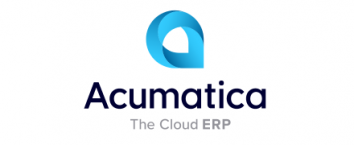





















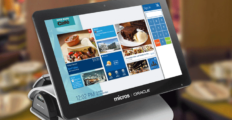

Leave a comment!